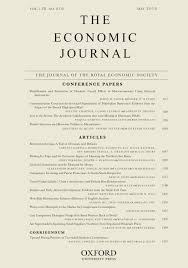
\van Wijnbergen\, S.J.G. (1984). The 'Dutch disease': a disease after all? Economic Journal, 94(373):41----.
-
Affiliated author
-
Publication year1984
-
JournalEconomic Journal
Many third world oil producers are encountering serious problems in building up a diversified export base, while West European oil and gas producers (Netherlands, United Kingdom) are suffering a decline in their traded goods (manufacturing) sector induced by real wage pressures. It is becoming increasingly clear that high but temporary oil revenues may be somewhat ora mixed blessing, the quip of The Economist notwithstanding. The mechanism behind this unbalance is clear enough: part of the oil revenues is spent on non-traded goods which leads to a real appreciation (i.e., a rise in the relative price of non-traded goods in terms of traded goods). This in turn draws resources out of the non-oil traded sector into the non-traded goods producing sector (Corden and Neary (1982); van Wijnbergen (1980)). One may say that this is an efficient response to the increase in income from oil production, the United Kingdom (Mexico, Egypt, ...) simply should move into oil derived industries and non-traded goods and forget about their manufacturing sector until oil reserves are exhausted. However, many developing countries are hesitant to take this advice: after all the post-World War II success stories in economic development involve without exception countries that promoted their traded goods sector aggressively. Moreover, it is a well-established 'stylised fact' that technological progress is faster in the traded non-sheltered sectors of an economy than in the non-traded sector (Balassa (1964) is an early reference). Considering the hypothesis that technological progress, rather than taking place exogenously with the passage of time, is a function of accumulated experience, the concern of countries like Egypt, Mexico or Indonesia is much easier to understand. Since Solow (1957) and Denison (1962) it is known that capital accumulation explain only a small part of economic growth. If most of economic growth is caused by Learning by Doing induced technologica...